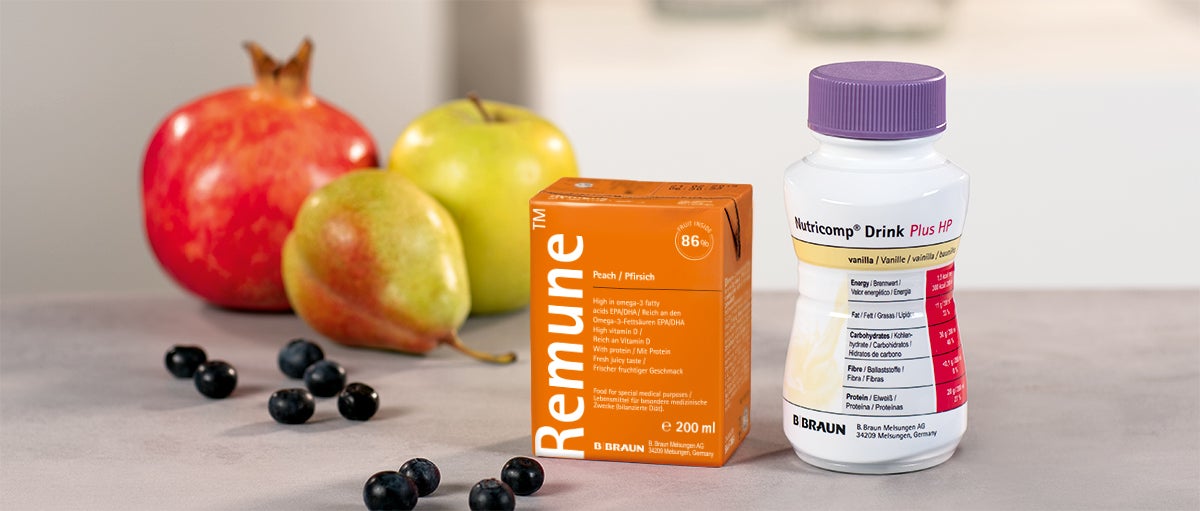Which nutrients are beneficial?
We all know that a healthy diet is essential for our overall well-being. There’s a reason athletes eat special diets composed by high-paid experts to make them perform in the best possible way.
Especially in times of illness, we consciously realize how our nutritional intake is affected by our state of health. The same effect occurs vice-versa: If we have an unbalanced diet, we’ll also feel bad. When diagnosed with a disease like cancer, being aware of your diet counts more than ever.
We’re under no illusions: Diet alone can’t cure disease! But a healthy diet creates better conditions for your well-being.
Be good to yourself. Nourish your body well.
The cells in our bodies work constantly. This process is called metabolism. It includes the breakdown and absorption of nutrients as well as the build-up and maintenance of the parts of the body. For this metabolism, the cells need energy (calories) and certain nutrients that perform central tasks in the body.
We need to take in the following nutrients in balanced amounts every day:
- Carbohydrates (e.g. starches)
- Protein
- Vitamins
- Fat
- Fiber
- Minerals and trace elements
- Water
Learn more about what your body needs and why.
How does your body benefit of these nutrients?
Well, you aren’t an athlete. Nevertheless, knowing about the functions and effects of nutrients will give you a leg up. As the old adage goes:
“Let food be thy medicine and medicine be thy food.” (Hippocrates)
Carbohydrates
They are your main source of energy. Your brain in particular needs them to function properly. When you feel hungry, tired or even worn out, these nutrients recharge your batteries by increasing your blood sugar level (glycemia), depending on the source of the carbohydrates.
If you don’t eat enough carbohydrates, your body can also break down valuable proteins to meet the brain’s energy needs.
Protein
Its effect is versatile. It's the major functional and structural component of all the cells in our body. Protein forms enzymes to protect our cells, heal wounds and build up the muscles. Furthermore, it ensures our digestion, immune response and clotting ability. Cancer patients during treatment have an increased need for protein (up to 1.2 – 1.5g/kg body weight, if renal function is not impaired).
Vitamins
Vitamins are essential nutrients. They among others play a central role in our energy, protein and bone metabolism, in blood coagulation, work as antioxiants, are needed as photoreceptors in our eyes and for wound healing, for the maturation of blood cells, and are essential for the functioning of many enzymes. Thus, vitamins help your body’s own defense, improve your well-being, keep the metabolism going, build up neurotransmitters in the brain and nerves, strengthen bones and tissues, protect the skin, and improve our concentration. Some vitamins are water-soluble, others are fat-soluble. Therefore, they are present in different foods which need to be combined (e.g. a colorful vegetable salad). A lack of vitamins can have serious consequences like scurvy.
Fat
Fat is the main energy store in the body. The cells in our body or our nerves can use fat as a nutrient.
Certain fatty acids, especially omega-3 fatty acids, as found in fatty, cold-water fish like cod and salmon, are very important for your ability to contol inflammatory processes in the body. Thus, they may be beneficial for cancer patients. If you include omega-3 fats from fish oil in your balanced diet, you may experience an increased appetite, lower inflammation and better immunological defense.
Fiber
The task of fiber is to regulate digestion. Soluble fiber may also be useful in lowering and your cholesterol level. They ensure the function of gut bacteria, called your microbiome. Furthermore, it can also support your immune system.
Minerals and trace elements
Minerals (Na, K, Ca, Mg, Cl, Phophate) are responsible for nerve function, bone and teeth formation and more. Trace elements, e.g. iron and selenium, are parts of enzymes and are essential nutrients for the proper growth, development, and physiology of the organism.
Water
Water is beneficial in many ways. It's involved in regulating your body temperature and hydrates your skin. It's also part of the body's fluid balance and transports nutrients. In a nutshell: Water is crucial for your overall body functions as it is the main component of the body. Make sure to always stay properly hydrated to







